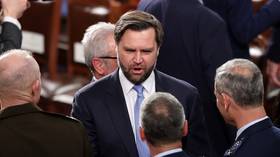By suggesting the presidential election can be delayed, Trump is flirting with becoming an autocratic dictator & inviting chaos
The president’s proposal to possibly postpone the polls in November threatens to delegitimize the very tenure in office he seeks to preserve, and the political integrity of the nation he ostensibly serves.
President Donald Trump, facing an uphill battle for re-election, today raised hackles across the political spectrum of the United States in a tweet suggesting the 2020 US presidential election be delayed. “With Universal Mail-In Voting (not Absentee Voting, which is good),” Trump tweeted, “2020 will be the most INACCURATE & FRAUDULENT Election in history. It will be a great embarrassment to the USA. Delay the Election until people can properly, securely and safely vote???”
With Universal Mail-In Voting (not Absentee Voting, which is good), 2020 will be the most INACCURATE & FRAUDULENT Election in history. It will be a great embarrassment to the USA. Delay the Election until people can properly, securely and safely vote???
— Donald J. Trump (@realDonaldTrump) July 30, 2020
President Trump’s Twitter outburst comes on the heels of comments made by Attorney General William Barr, speaking to the House Judiciary Committee earlier this week, about the potential of voter fraud in the upcoming presidential election. Barr claimed there was “a high risk” that mail-in voting would lead to “massive” fraud, noting that “if you have wholesale mail-in voting, it substantially increases the risk of fraud.”
When queried by Representative Cedric Richmond about whether a sitting US president could unilaterally move the date of a presidential election, Barr answered, “Actually, I haven’t looked into that question under the Constitution,” leaving the door open to the possibility that Trump took Barr’s obfuscation as a green light.
While the attorney general of the US may not have looked into the constitutionality of the president changing processes for electing a US president that are clearly spelled out in the Constitution, there are many from both sides of the political aisle who have. All are in universal agreement: the president has no authority to do so.
The ‘Presidential Election Day Act’, passed by Congress in 1845, mandates that “the electors of President and Vice President shall be appointed in each State on the Tuesday next after the first Monday in the month of November of the year in which they are to be appointed.” Any alteration of this law would require an act of Congress. Given the highly charged partisanship of the current American political climate, such action is not likely to be forthcoming.
In any event, Section 1 of the 20th Amendment of the US Constitution declares that “[t]he terms of the President and Vice President shall end at noon on the 20th day of January, and the terms of Senators and Representatives at noon on the 3rd day of January.”
Also on rt.com Trump moots delaying 2020 election over mail-in poll concerns ‘until people can properly, securely & safely vote’Even if the president were to convince Congress that a delay was necessary, such a delay could not be used by Trump in an attempt to hold onto power – unless he prevails in the election, his term comes to an end at the time prescribed by the Constitution.
This doesn’t mean that Trump and Barr could not, by aggressively advocating for a delay in such a manner as to actually impede the ability of US citizens to cast their votes on November 3, 2020, generate enough chaos as to make a national popular vote impossible to quantify.
But even here, the Constitution has a remedy – the Electoral College. While currently the selection of members of the Electoral College is tied to the popular vote as calculated in each individual State, the fact is that Article II, Section 1 of the Constitution allows the states latitude as to how electors are selected (“Each state shall appoint, in such manner as the Legislature thereof may direct, a number of electors, equal to the whole number of Senators and Representatives to which the State may be entitled in the Congress”), creating the possibility that the Electoral Convention could be convened without a popular vote having been conducted.
This is unchartered territory, and the likelihood that all 50 states would be able to get their respective legislative bodies to act decisively and pass legislation allowing for the selection of electors absent a popular vote is virtually nil. But even here, Article II, Section 1 provides a solution: in the event the Electoral College is unable to choose a president, then the matter is passed onto the House of Representatives, which will vote by state, with each state getting one vote. But such a process will most likely not be without controversy.
Any delay to the November 3, 2020 election that did not produce a fair and equitable election process in all 50 states would create the conditions for any decision that rested on the determination of an elected body to be challenged.
In short, even if the House were able to elect a president, that decision would more than likely not have the approval of a significant number of states. In a democracy where the power to rule is incontrovertibly attached to the consent of the people to be ruled, any president so elected would find his or her legitimacy to govern challenged. Chaos and anarchy would likely follow, and with it the prospects for civil war.
Also on rt.com Does Trump want Pelosi for president? Twitter goes wild over his suggestion to delay electionThe likelihood that such a scenario would, or even could, play out in America today is virtually nil. The risks of such an undertaking are so grave that even the most partisan of Trump supporters would oppose any serious effort at delaying the November 3 election date.
This begs the question as to what the motivation on the part of President Trump is to even float the possibility of an action which, if acted on without the consent of Congress, constitutes nothing less than sedition. The obvious answer is that the president, facing a precipitous decline in popular support as reflected in multiple polls, is seeking a way to delay an inevitable defeat at the polls.
Those surrounding the president, first and foremost among them being the attorney general, need to impress upon him just how dangerous the ground is on which he is seeking to tread. There are far worse things than losing a popular election; any move that sought to undermine the constitutional right of American citizens to elect the Chief Executive would transition Trump away from being a “duly elected president,” and define him instead as an “autocratic dictator.” The former tend to do well in political transition; the latter do not.
Think your friends would be interested? Share this story!
The statements, views and opinions expressed in this column are solely those of the author and do not necessarily represent those of RT.















